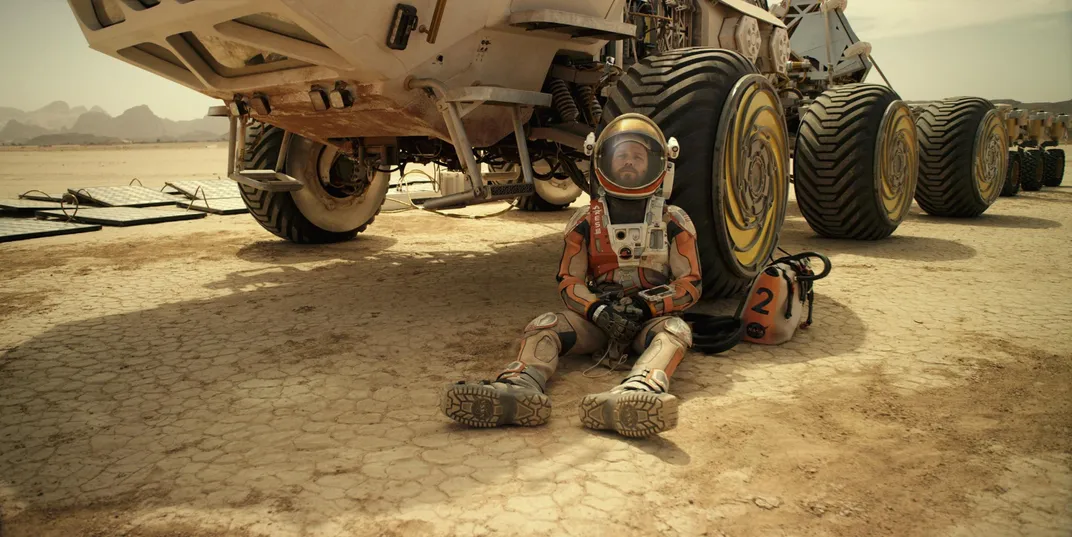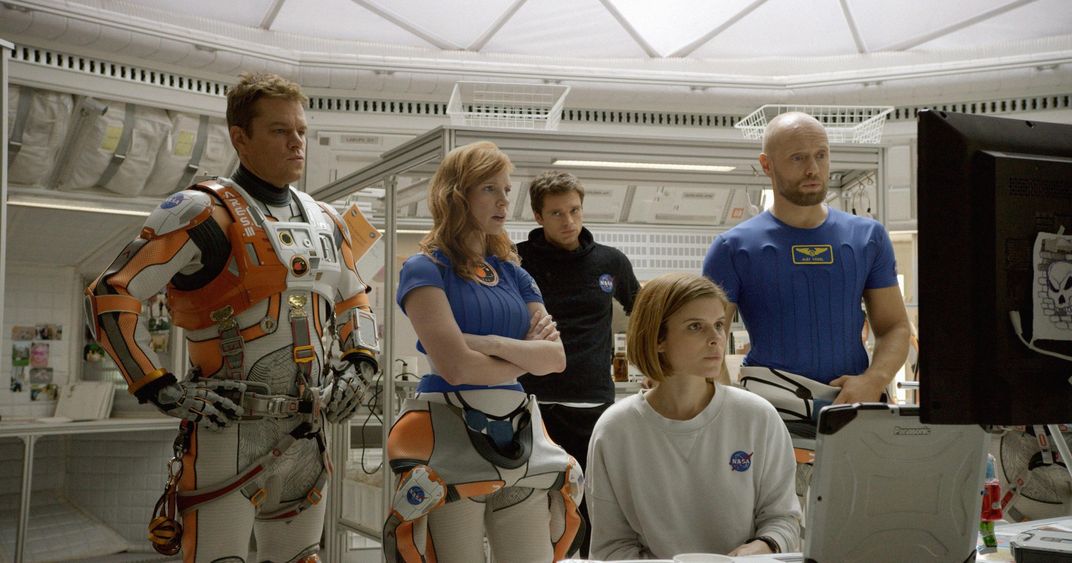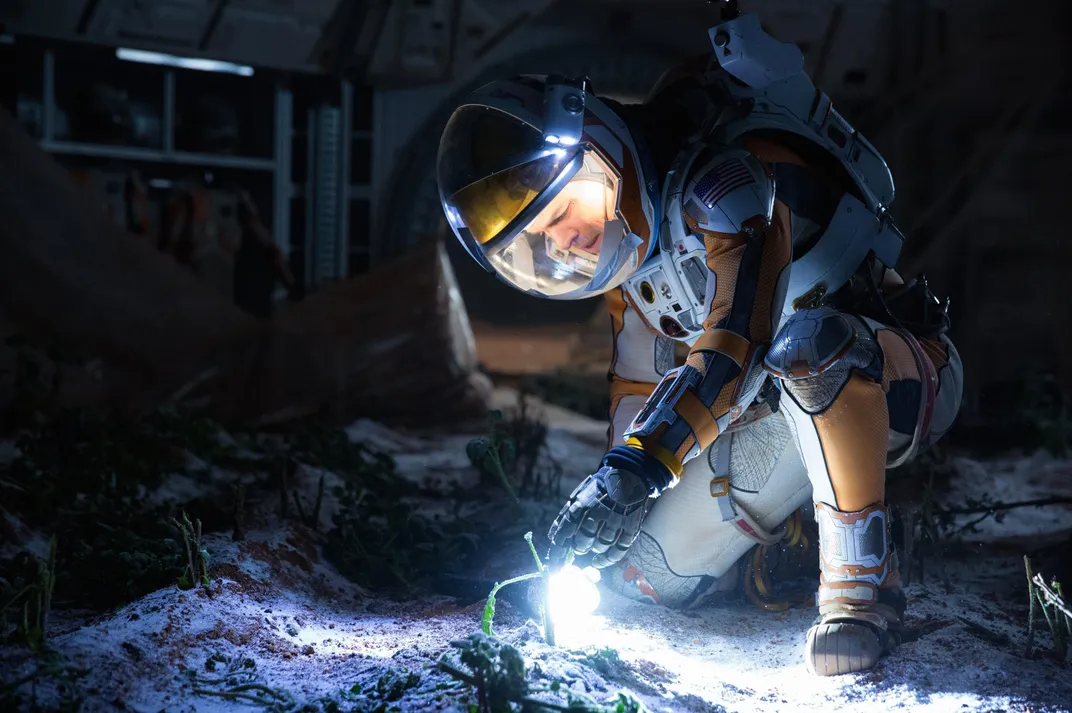Interview: Matt Damon, First Farmer on Mars
The actor discusses his role as an astronaut in the upcoming film “The Martian.”
/https://tf-cmsv2-smithsonianmag-media.s3.amazonaws.com/filer/0a/66/0a66f344-78d2-413d-8b37-ed93eb97b92c/the_martian_-_aidan_monaghan__20th_century_fox.jpg)
Before the stranded-on-Mars survival thriller The Martian got turned into a movie (due out October 2) it was computer programmer Andy Weir’s bestselling first novel. And before it was that, it was just a series of posts you could read for free on Weir’s personal blog. (His Doctor Who and Sherlock Holmes fanfic is still posted there.)
Weir’s story explains in compelling detail how astronaut Mark Watney, the left-behind member of a Mars expedition, figures out how to send a distress call to Earth, and to extend his limited supplies of water, food, air, and shelter over the period of years it will take any rescue attempt to reach him. Watney’s humor, along with his resourcefulness, make him a likeable hero, so it’s no surprise that Ridley Scott—director of the sci-fi classics Alien and Blade Runner, along with Gladiator, Black Hawk Down, and many others—cast Matt Damon in the role. Air & Space Associate Editor Chris Klimek got on the phone with the 44-year-old actor (himself an Oscar-winning co-screenwriter, with Ben Affleck, for 1997’s Good Will Hunting) on August 26 to discuss The Martian and his other recent space movie Interstellar.
This interview has been lightly condensed and edited for clarity.
Air & Space: The novel The Martian isn’t entirely in the first person, but much of it is told through the log of your character, stranded astronaut Mark Watney. And much of it is math—the calculations he does to extend his limited supply of oxygen and food, and so on. He jokes about his slim odds of survival, but he never expresses fear that I can recall. He mostly just talks about the endless tasks he’s performing to keep himself alive. So my question is whether that makes your job as an actor harder or easier, to have to fill in emotion that isn’t there, or is present only very subtly, on the page?
Damon: That was my first question for Ridley Scott when we talked: How do we infuse it with some sense of dread and terror and have the stakes as high as they can be, which you really need for the movie to work, and to create a realistic look at the situation the guy is in, while retaining the humor and the fun—because it’s a really entertaining story. It’s funny in a lot of places. That was always the line tonally we had to walk.
I brought up the movie Touching the Void [a 2003 documentary based on Joe Simpson’s memoir of his near-fatal climb, with Simon Yates, of a 21,000-foot mountain in the Peruvian Andes]. I don’t know if you ever saw that one, but it’s a really great film. What it does really well is explore the existential dread and solitude and desperation of these two guys.
So I talked to Ridley about that: How do we, without changing the DNA of the movie, get little moments in there that will keep that tension? We ended up shooting in the desert, in Wadi Rum, Jordan. And Ridley said, “Look, it could be just as simple as looking at your small figure on this vast expanse of desert. Or you in the rover puttering along, this tiny vehicle on this giant, inhospitable planet. Shots like that serve as a reminder of the fix this guy is in, and ramp up that sense of dread.”
It struck me that adapting this particular novel might offer a filmmaker an unusual opportunity, because all we hear from Watney in the book is what he dictates into the official mission log, which he knows will be recovered and studied, whether or not he survives. So he might be editing himself. There could be moments where he’s an unreliable narrator, and the camera shows us what’s happening to him when he isn’t keeping his own record.
Yeah. We talked about that, too. One of the things Ridley said was, “I’ve always wanted to make Robinson Crusoe, and I feel like this is my chance to do it.” But what we soon discovered is that it’s different in that it’s not a guy by himself on an island—it’s a guy by himself on a planet who has the expectation that he’s being observed. There are Go-Pros and cameras all around the hab he’s living in. He’s behaving with every intention that these things will be discovered and mined for all the information on them. So it’s solitude, but he’s not living as though he’s completely alone.
/https://tf-cmsv2-smithsonianmag-media.s3.amazonaws.com/filer/4c/21/4c2100e3-0fb1-4ac3-8354-ad528abdec44/the_martian_-_damon_as_watney_-_courtesy_20th_century_fox.jpg)
I was trying to recall if you’ve ever played a role like this, where you’re alone for the majority of your scenes, assuming the movie doesn’t depart dramatically from the novel. It would be like doing a one-man show, in a way.
The closest thing would probably be the Bourne movies. I end up on my own, usually, in those, at least in the second two. But that was the appeal of this. It was so different from anything I’d ever done before. I have these long monologues to nobody. [Laughs.]
I never would’ve considered doing it had it not been for a world-class director. It’s a very risky thing to do, but I had faith in Ridley being able to strike the right tone for it.
I’ve heard that guy made a couple of pretty good science fiction movies back in the day.
[Laughs.] Yeah, I figured going to space with Ridley was a good bet.
I know The Martian is a different kind of movie than the one I’m going to name, but when I read that the novel was being adapted, a film I thought of right away is All Is Lost. That, too, is about a guy who must use his resourcefulness and intellect to survive in a hostile environment—it’s Robert Redford alone on a sinking boat—but it has a much bleaker tone than The Martian does. Redford barely speaks in All Is Lost, but he conveys so much silently. We get that that character—I don’t think we even learn his name—is clearly a sadder, more regretful man than Watney is. Did you see that film?
No. I kept meaning to, because I heard Redford was extraordinary in it. I still intend to. From what I understand, though, he’s not behaving in that movie as though he’s being watched. That’s why he doesn’t talk. Who would he be talking to?

In this story, NASA completely upends its priorities and makes Watney’s rescue its entire mission, interrupting all the other science it’s working on to save one life. We’re in this period where we’re learning so much about the universe, but most of those discoveries are coming from unmanned spacecraft. And of course NASA really does want to send a crew to Mars in 20 years, give or take. The Martian could be read as a dramatization of the incredible difficulty and inefficiency of keeping fragile human beings alive in space and on other planets. Does the movie take a position on that, in your view? Like, maybe we should just let the robots handle this?
On the contrary, I think the movie celebrates that pioneer spirit that these guys have. And we have to be thinking about trying to get some of us off of Earth, to guarantee that human beings survive. As expensive as it is and as difficult as it is, it’s necessary.
That’s a good segue into talking about Interstellar, Christopher Nolan’s movie about humanity desperately seeking a new home in the middle or late 21st century. Here you are, just a year after that film, playing another astronaut who must endure a long isolation on an alien planet. Is that just a coincidence, that these two projects lined up the way they did?
Yeah. Two great directors came to me within a year of each other. They’re very different movies, but the circumstances of the characters I play are exactly the same! [Laughs.] That irony wasn’t lost on me. Luckily, they’re very different in feel and tone and theme. I just couldn’t say no to Ridley.

Your face is all over the posters for The Martian, whereas with Interstellar, Nolan and the studio and everyone did a good job of keeping your presence in that movie a secret. The fact that you are at least as big a star as anyone else in that film, but you don’t show up for a long time, makes the actions of your character, Dr. Mann, and his fate, more surprising. The Talented Mr. Ripley and The Departed aside, audiences are used to seeing you play the guy we can count on, you know?
Yeah. There are three or four references to my character before he comes onscreen, and every time he’s mentioned, someone says, “He was the best of us!” [Laughs.] Chris was really setting up the audience there.
Well, on subsequent viewings, that sticks out more. Has playing a pioneer astronaut in two back-to-back movies deepened your interest in spaceflight or astronomy?
I’ve always been a big science fiction fan. Getting to go to JPL [for a press event event for the movie] and meeting some of the astronauts was incredibly humbling. What they do is awesome. I don’t think I want to experience space travel, at least not in the near future. But it’s definitely given me an appreciation of what these guys do.
Your guy, Watney, is an astronaut, a botanist, and at least a makeshift electrical engineer. Obviously it would take decades to learn to do all the things this guy can do, but do you feel like you need to try to acquire at least a tiny fraction of the character’s skill set to feel confident playing someone like that?
Nah, I didn’t have to learn anything. I did learn how to grow potatoes. That was kind of inevitable, because we just grew them. We had potatoes at various stages of growth for all these different scenes. They were growing them in a soundstage adjacent to the one we were shooting in. So we planted them and re-planted them on the set.
Growing potatoes in Jordan must count for something.
We did that on a soundstage in Budapest.

Ah. Well, did you consult any astronauts? What sort of research did you feel was necessary?
It was more just sitting with Ridley and going through the script moment-by-moment to design a plan of attack. But we had technical consultants. NASA was incredibly helpful and available to us. We did want to get the science right. That was always Andy Weir’s contention, that he’d started with the question, Could a person survive on Mars? and then just let the science lead the story. We wanted the movie to do that, too. We didn’t want any gaps in logic.
Did you shoot the movie in sequence? It seems that it would be important for us to see Watney’s physical condition erode over time.
No, we didn’t. That was my idea. I asked Ridley if we could shoot the third act first, so I could lose the weight, and then, over Christmas break, try to put some weight back on and shoot the beginning of the movie. That was the plan. But then when we scheduled it out, because we had to go to Jordan and shoot our exteriors all at the same time, we realized that wouldn’t work. So we shot it all out-of-order.
And you went to JPL?
Yeah. We were there just last week.
Do you remember who you talked to there?
I met about 30 rocket scientists and PhDs. [Laughs.] I met one of the astronauts, Drew—what was Drew’s last name?
It’s worse that I don’t know than that you don’t.
I talked to Scott Kelly aboard the International Space Station. He’s about halfway through his time there. Talking to these guys, studying the effects of all of this stuff on their bodies—it’s awesome what these guys are doing. And they do it with such humility, and such a sense of these ideas being more important than their own lives. Hopefully, the movie will be a love letter to those guys.
Oh, it was Drew Feustel!
Since we have a minute left, I’ll ask you this: You and Paul Greengrass have a fourth Jason Bourne movie in the works. That’s scheduled to come out next summer, by which point nine years will have gone by since you last played that character. Why did you decide to do another one after such a long break?
Well, we talked about it periodically over the years. We both wanted to do it someday, maybe, but we were kind of done with the character. We didn’t know if he had anything left to say. We needed to wait for the world to change a little bit. And that happened. All the issues of national security that are alive now are interesting, and different from the ones during the Bush Administration. We got to a point where we felt the character would have something to say about this, so let’s bring him back.
For me the clinching thing was that Paul was going to direct it. I always said I’d do it if Paul came back. Obviously there was interest, over the years, on the studio side.
They even made one with Jeremy Renner.
Yeah, they did! And that franchise is still alive. Ours won’t do anything to impede that one. If they want to make more of those, they can do that.

